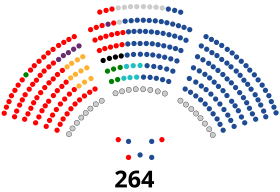
Back Senau d'Espanya AN مجلس الشيوخ الإسباني Arabic مجلس الشيوخ الاسبانى ARZ Senáu d'España AST Senat d'Espanya Catalan Senát Španělska Czech Senado (Spanien) German Γερουσία της Ισπανίας Greek Senato de Hispanio Esperanto Senado de España Spanish
Senate of Spain | |
|---|---|
| 15th Senate of Spain | |
 | |
| Type | |
| Type | |
| History | |
| Founded | 1834 (disbanded 1923–1977) 1977 (reinstituted) |
| Leadership | |
Majority leader | Alicia García Rodríguez (PP) since 30 November 2023 |
Minority leader | Juan Espadas (PSOE) since 27 November 2023 |
| Structure | |
| Seats | 266 |
 | |
Political groups | Government (93)
Opposition (149) |
| Elections | |
| Limited voting (208 seats) Election by the legislatures of the autonomous communities (57 seats) | |
Last election | 23 July 2023 |
| Meeting place | |
 | |
| Palacio del Senado Centro, Madrid Kingdom of Spain | |
| Website | |
| senado | |
| Rules | |
| Senate Standing Orders | |
The Senate (Spanish: Senado) is the upper house of the Cortes Generales, which along with the Congress of Deputies – the lower chamber – comprises the Parliament of the Kingdom of Spain. The Senate meets in the Palace of the Senate in Madrid.
The composition of the Senate is established in Part III of the Spanish Constitution. Each senator represents a province, an autonomous city or an autonomous community. Each mainland province, regardless of its population size, is equally represented by four senators; in the insular provinces, the big islands are represented by three senators and the minor islands are represented by a single senator. Likewise, the autonomous cities of Ceuta and Melilla elect two senators each. This direct election results in the election of 208 senators by the citizens. In addition, the regional legislatures also designate their own representatives, one senator for each autonomous community and another for every million residents, resulting in a total of 58 additional senators.
The Spanish Senate is constitutionally described as a territorial chamber. Its powers are similar to those of the Congress of Deputies. However, by virtue of its role as a territorial chamber, it is endowed with exceptional powers such as authorising the Government of the Nation to apply direct rule on a region or to dissolve city councils. The presiding officer of the Senate is the president of the Senate, who is elected by the members thereof.
Cite error: There are <ref group=lower-alpha> tags or {{efn}} templates on this page, but the references will not show without a {{reflist|group=lower-alpha}} template or {{notelist}} template (see the help page).
© MMXXIII Rich X Search. We shall prevail. All rights reserved. Rich X Search